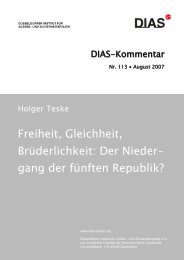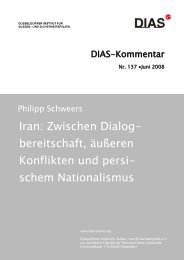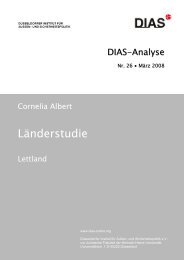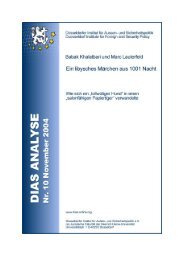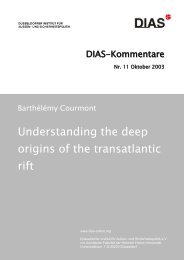NATO Collective Security or Defense - DIAS - Düsseldorfer Institut ...
NATO Collective Security or Defense - DIAS - Düsseldorfer Institut ...
NATO Collective Security or Defense - DIAS - Düsseldorfer Institut ...
You also want an ePaper? Increase the reach of your titles
YUMPU automatically turns print PDFs into web optimized ePapers that Google loves.
Joshua Stern: <strong>NATO</strong> <strong>Collective</strong> <strong>Security</strong> <strong>or</strong> <strong>Defense</strong>: The Future of <strong>NATO</strong> in Light of Expansion and 9/11<br />
that relates m<strong>or</strong>e to <strong>NATO</strong> transf<strong>or</strong>mation is explained by David Yost in his book <strong>NATO</strong><br />
Transf<strong>or</strong>med.<br />
“ the Allies to date have wisely resisted calls to move toward a Kantian <strong>or</strong> Wilsonian system<br />
of collective security (Liberal). Such a system would imply obligations to deal with all cases<br />
of international aggression and injustice in the Euro-Atlantic region. In practice, despite their<br />
rather sweeping “security is indivisible” rhet<strong>or</strong>ic, the Allies have pursued only collective security<br />
of the maj<strong>or</strong>-power-consensus type, offering to act in supp<strong>or</strong>t of collective security under<br />
the auspices of the UN <strong>Security</strong> Council and the OSCE”.<br />
Acc<strong>or</strong>ding to Yost, it would seem <strong>NATO</strong> has adopted a collective security framew<strong>or</strong>k based<br />
on the concept of collective defense. This relates back to the strategic concept and the idea<br />
<strong>NATO</strong> must face outside instability, because in the long term this can threaten <strong>NATO</strong> members‟<br />
security.<br />
Even with this said there is a fundamental difference between a collective security <strong>or</strong>ganization<br />
and a collective defense <strong>or</strong>ganization. The two differ because they have different philosophies<br />
underlying their use. <strong>Collective</strong> defense is often affiliated with realism and collective<br />
secu-rity with liberalism. The realist perspective has a Hobbesian view of the w<strong>or</strong>ld. It is a<br />
w<strong>or</strong>ld where anarchy rules in international relations, a w<strong>or</strong>ld without binding international<br />
rules, and where governments‟ main concern is their own self-interest. Since governments‟<br />
highest concern is self interest, international relations is about power <strong>or</strong> getting countries to<br />
do what you want. Acc<strong>or</strong>d-ing to the realist paradigm, the w<strong>or</strong>ld is a zero-sum game, where if<br />
one country gains another country has to lose. Under these conditions a collective defense <strong>or</strong>ganizations<br />
is m<strong>or</strong>e effective than a collective security <strong>or</strong>ganizations because it asks members<br />
to “identify with a specific threat common to them and can agree to mount mutual defense eff<strong>or</strong>ts<br />
against that threat”. Meaning multilateral security alliances will w<strong>or</strong>k only if states believe<br />
being active in one will help <strong>or</strong> pro-tect their interest. On the other hand, the doctrine of<br />
collective security is very different. Collec-tive security is based on the idealist <strong>or</strong> liberal<br />
perspective of international relations. The concept of collective security is usually tied to<br />
Woodrow Wilson and Immanuel Kant. “Renouncing power politics, Wilson rejected the contention<br />
that states inevitably function in a self-help system in which they necessarily place<br />
their own interests above the concern. He assumed that because states have „clear‟ interests in<br />
protecting international <strong>or</strong>der that they see as beneficial to their individual security, they will<br />
contribute to the coalition even if they have no vital interest at stake in the actual aggression”.<br />
Liberalism believes in international law, and that countries will uphold this law because in the<br />
long run it is in their self-interest. The point of this paper is not if either one of these philosophies<br />
is right <strong>or</strong> wrong. What is imp<strong>or</strong>tant is the strategic change <strong>NATO</strong> made in its role<br />
af-ter the Cold War. In countless documents and summits after the Cold War, <strong>NATO</strong> stated<br />
the need to engage in the security issues outside of its members, to protect its members in a<br />
post Cold War w<strong>or</strong>ld.<br />
<strong>NATO</strong>‟s action in the 1990 has fit the liberal collective security definition, but tends to have<br />
the realist outcome. In Bosnia, <strong>NATO</strong> was indecisive f<strong>or</strong> a long period of time, due to a lack<br />
of resolve and a feeling the conflict was not in their direct interest. When <strong>NATO</strong> finally f<strong>or</strong>cefully<br />
became involved it was out of fear if the alliance did not act it would be viewed as a<br />
failure. In Kosovo, <strong>NATO</strong> acted m<strong>or</strong>e f<strong>or</strong>cefully but still ran into problems. The alliance was<br />
very uncertain on whether it would use ground troops if the air campaign was unsuccessful,<br />
and its ability to conduct the air campaign was hampered by having nineteen members.<br />
The imp<strong>or</strong>tant point here is in the 1990‟s when <strong>NATO</strong> was not acting in the direct inter-est of<br />
its members <strong>or</strong> there was no direct <strong>or</strong> clear threat, these sh<strong>or</strong>t comings were overlooked, <strong>or</strong>



